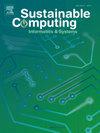DEEPCO-RIS: Joint BD-RIS and hybrid NOMA/OMA optimization for energy-efficient vehicular networks
IF 5.7
3区 计算机科学
Q1 COMPUTER SCIENCE, HARDWARE & ARCHITECTURE
引用次数: 0
Abstract
Next-generation vehicular networks require wireless infrastructures that deliver ultra-reliable, energy-efficient, and low-latency communication under highly dynamic conditions. Traditional RIS-aided and hybrid NOMA/OMA designs face critical limitations, including rigid phase control, high successive interference cancellation (SIC) complexity, and limited adaptability to rapid vehicular mobility. To address these challenges, this paper proposes DEEPCO-RIS (Dinkelbach-Enhanced Energy-Efficient Optimization with Beyond-Diagonal RIS), a unified optimization framework that integrates BD-RIS phase configuration, hybrid NOMA/OMA access mode selection, user scheduling, and power allocation. These components are jointly optimized under realistic constraints, including SIC feasibility, power budgets, RIS energy costs, and QoS guarantees. The energy efficiency maximization problem is formulated as a mixed-integer non-convex program and solved using a modular approach combining Dinkelbach’s method, block coordinate descent, successive convex approximation, and manifold-based optimization for BD-RIS tuning. Extensive simulations demonstrate that DEEPCO-RIS achieves up to 22 Mbits/Joule energy efficiency, maintains outage probabilities below 6% even under stringent QoS targets, and exhibits strong robustness against SIC imperfections and network load variations. These results establish DEEPCO-RIS as a scalable and sustainable solution for next-generation vehicular communication networks.
DEEPCO-RIS:联合BD-RIS和混合NOMA/OMA优化节能汽车网络
下一代车载网络需要在高动态条件下提供超可靠、节能和低延迟通信的无线基础设施。传统的ris辅助和混合NOMA/OMA设计面临着严重的局限性,包括刚性相位控制、高连续干扰消除(SIC)复杂性以及对快速车辆移动的有限适应性。为了应对这些挑战,本文提出了DEEPCO-RIS (Dinkelbach-Enhanced efficient Optimization with Beyond-Diagonal RIS),这是一个集成了BD-RIS相位配置、混合NOMA/OMA接入模式选择、用户调度和功率分配的统一优化框架。这些组件在实际约束条件下进行了联合优化,包括SIC可行性、功率预算、RIS能源成本和QoS保证。能源效率最大化问题被表述为一个混合整数非凸程序,并使用结合Dinkelbach方法、块坐标下降、连续凸逼近和基于流形的BD-RIS优化的模块化方法来解决。大量的仿真表明,DEEPCO-RIS可以实现高达22兆比特/焦耳的能量效率,即使在严格的QoS目标下,也可以将中断概率保持在6%以下,并且对SIC缺陷和网络负载变化具有很强的鲁棒性。这些结果使DEEPCO-RIS成为下一代车辆通信网络的可扩展和可持续解决方案。
本文章由计算机程序翻译,如有差异,请以英文原文为准。
求助全文
约1分钟内获得全文
求助全文
来源期刊

Sustainable Computing-Informatics & Systems
COMPUTER SCIENCE, HARDWARE & ARCHITECTUREC-COMPUTER SCIENCE, INFORMATION SYSTEMS
CiteScore
10.70
自引率
4.40%
发文量
142
期刊介绍:
Sustainable computing is a rapidly expanding research area spanning the fields of computer science and engineering, electrical engineering as well as other engineering disciplines. The aim of Sustainable Computing: Informatics and Systems (SUSCOM) is to publish the myriad research findings related to energy-aware and thermal-aware management of computing resource. Equally important is a spectrum of related research issues such as applications of computing that can have ecological and societal impacts. SUSCOM publishes original and timely research papers and survey articles in current areas of power, energy, temperature, and environment related research areas of current importance to readers. SUSCOM has an editorial board comprising prominent researchers from around the world and selects competitively evaluated peer-reviewed papers.
 求助内容:
求助内容: 应助结果提醒方式:
应助结果提醒方式:


